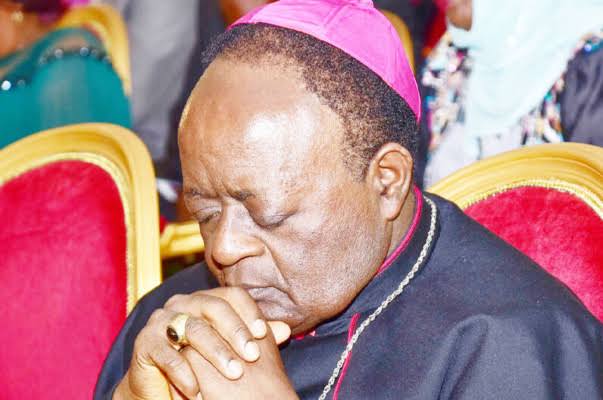The postmortem report of Kampala Archbishop Cyprian Kizito Lwanga hangs in balance after a team of pathologists fail to avail results in required time frame.
Sources with knowledge of the autopsy said the exercise was carried out jointly by the government and private pathologists sent by the Catholic Church.
Specialists, including Prof Michael Odida, consultant pathologis, Mukasa Nsereko and police pathologists witnessed or participated in the examination.
This website was informed that the initial postmortem was done at Mulago National Referral Hospital mortuary on Saturday lasting into the late evening.
The prelate’s body was reportedly thereafter moved to Rubaga Hospital.
A preliminary investigation that yields no cause of death in medical science is categorised as “sudden death” and can derive from different causes.
Some of the cause, according to a January 20, 2015 article in the Journal of Emergency Medical Emergencies, include arrhythmia (irregular heart beat), acute myocardia (artery rupture), intracranial catastrophe (low oxygen supply to the brain), pulmonary embolism (blood clot) and dissection rupture from long-term comorbidities such as hypertension and high cholesterol.
The Catholic Church yesterday declined to speculate on cause of death, saying they had received no autopsy results.
The failure to find what caused the death to Archbishop Lwanga has led to the delay in the issuance of the post-mortem preliminary report.
Instead, the examiners have opted to carry out further toxicological and histological analysis, the first to find out there if is poison in the body while the latter test involving examination of internal organs under the microscope is to establish if cause of death can be attributable to any organ.
Police spokesperson Fred Enanga said there are several tests that are still being carried out before the report is issued.
“The postmortem examination was done, but the report isn’t yet out,” Mr Enanga said yesterday.
Archbishop Lwanga was found dead in his room on Saturday morning, hours after he led the public Way of The Cross in Kampala and delivered the Uganda Joint Christian Council Easter message.
A preliminary autopsy report is often released within 24 hours after the examination.
The extensive examination can take longer, weeks or months, and the tests may be conducted within or outside the country.
Recently, police and the Directorate of Government Analytical Laboratory acquired advanced forensic technology to analyse toxic agents.
Before and after the 2021 elections, Archbishop Lwanga repeatedly hinted that his life was in danger, and it remained unclear who wanted to kill him. In 2018, before the Easter festivity, Archbishop Lwanga said unidentified people in a numberless vehicle parked at the entrance to his residence in Rubaga, a Kampala outskirt, but they sped off when police officers approached to find out who they were.
He later spoke about receiving telephone calls from unknown people threatening to harm him if he continued criticising the government.
The prelate had, among others, questions the violence meted by state security forces on civilians during and after the presidential elections, the abduction of opposition supporters many of whose whereabouts remained unknown as well as other grotesque rights violations in the country.
He said the spate of disappearances of citizens made the ruling National Resistance Movement government look like the Idi Amin regime unless they changed course.
After the incident of strangers parking at the gate of the place of abode of Archbishop Lwanga, the Inspector General of Police, Mr Martins Okoth Ochola, visited the primate and gave him armed guards.
Archbishop Lwanga, who has also worked closely with the government on a range of development projects, including rehabilitation of Uganda Martyrs Shrines in Namugongo, previously accused security agencies of infiltrating the Catholic Church and hiring priests to gather intelligence on its leaders.
President Museveni and Archbishop Lwanga later met over allegations of spying on him, although the prelate severally reiterated continued threat to his life.
There is no evidence as of yet to suggest a foul play in Lwanga’s death, but some bishops and former presidential candidate Robert Kyagulanyi, alias Bobi Wine, yesterday questioned the suddenness and cause.
Sudden deaths
Sudden deaths of prominent people in Uganda has always attracted conspiracy theories of foul play.
In 2012, the sudden death of youthful Butaleja District Woman MP Cerinah Nebanda shocked the nation and many of her colleague legislators and family members alleged that she could have been poisoned.
They attempted to carry out private examinations, but government stopped it leading to the arrest at Entebbe International Airport of a senior pathologist, Dr Sylvester Onzivua and some legislators as they attempted to take samples from the deceased for toxicological analysis in South Africa. Archbishop Lwanga joins the list of other high-profile citizens to drop dead suddenly.
Other such cases included that of Brig Nobel Mayombo, the then Defence ministry permanent secretary, whom some people alleged was poisoned.
The government constituted a team of experts, which investigated the death, but the report wasn’t made public although President Museveni said Brig Mayombo did not die of poison and that he had been on the radar of some foreign states.
In the months after falling out with the government, the former coordinator of Intelligence, Gen David Sejusa, claimed that the threat of being poisoned was real that senior military officers and ministers carried own food and water to meetings.
Dr Lwanga’s burial plans
Monday, April 5: Mass at Rubaga Cathedral at 2pm
Tuesday: Mass at Kyabakadde (Lugazi Diocese) starting at midday
Wednesday: Funeral mass at Namugongo Catholic Shrine starting at 10am .
Thursday: Burial at Rubaga


